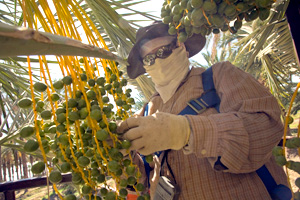Workers’ Compensation

About half of all states have little or no coverage for farmworkers. Learn which states provide coverage and claim filing barriers.

Photo by David Bacon
Although agriculture is one of the nation's most hazardous industries, about half of all states allow agricultural employers to provide little or no workers' compensation coverage for migrant and seasonal farmworkers.
Workers' Compensation Coverage Varies by State
Workers' compensation benefits are secured by insurance policies, paid for by the employer. Each state has its own standards and rules. When a covered worker suffers a job-related injury or illness, she can receive medical benefits and/or a portion of her lost wages, if she files a workers' compensation claim and that claim is approved.
Many states do not require agricultural employers to provide workers compensation coverage for migrant and seasonal farmworkers. The states are almost evenly split between those that provide all or most migrant and seasonal farmworkers with workers' compensation coverage and those that require little or no coverage for this workforce. Specifically, only 13 states, the District of Columbia, Puerto Rico and the Virgin Islands require employers to cover seasonal agricultural workers to the same extent as all other workers. These jurisdictions are: Arizona, California, Colorado, Connecticut, the District of Columbia, Hawaii, Idaho, Massachusetts, Minnesota, Montana, New Hampshire, New Jersey, Ohio, Oregon, Puerto Rico and the Virgin Islands. In an additional 13 states (including Florida and New York), only small farmers are exempt from providing coverage to their migrant and seasonal farmworkers. Moreover, employers who hire legal temporary foreign workers, under the H-2A visa program, are required to provide workers' compensation insurance or equivalent benefits to their employees.
By contrast, 16 states do not require employers to provide any workers compensation insurance for migrant or seasonal farmworkers. These states are: Alabama, Arkansas, Delaware, Georgia, Indiana, Kansas, Kentucky, Mississippi, Missouri, Nebraska, Nevada, New Mexico, North Dakota, South Carolina, Tennessee and Texas. In an additional eight states, coverage is limited to full-time workers (e.g., Maine), workers in specialty jobs (e.g., South Dakota), or those employed on large farms (e.g., Rhode Island).
Download a PDF of worker's compensation coverage by state .
What prevents farmworkers from accessing worker's comp?
There are many obstacles preventing farmworkers from securing needed workers compensation benefits. They include: lack of coverage; a small, but growing trend for states to reduce or deny benefits to undocumented workers; workers' reluctance to file claims for fear of employer retaliation; and the difficulty of finding a doctor who will keep farmworkers off work long enough to allow them to fully recover. Without workers' compensation benefits, however, injured farmworkers often forgo needed treatment or go into debt to obtain it.
Limiting protections for undocumented workers
States are beginning to follow the U.S. Supreme Court's decision in Hoffman Plastics v. NLRB, 535 U.S. 137, 122 S. Ct. 1275, 152 L. Ed. 2d 271 (2002), by limiting or eliminating benefits for undocumented workers. For example, in Michigan and Pennsylvania, courts have ruled that injured, undocumented employees could receive medical benefits, but not replacement wages. In Maine, the legislature has gone even further, prohibiting undocumented workers from receiving any workers' compensation benefits.
Employer Retaliation
Due to the vulnerability of this workforce, employer threats of retaliation discourage many farmworkers from filing workers' compensation claims, even when they are eligible for benefits. While this practice is illegal, few cases are successfully prosecuted. This is due, in part, to the fact that undocumented workers are not eligible for federally funded legal services and that many workers would rather forego their claim than risk losing their jobs.
Lack of help from health care providers
Finally, farmworkers face obstacles in finding a doctor who will handle their workers' compensation cases. Many migrant clinics are reluctant to handle such cases and other clinicians may not have the language skills or cultural competency to effectively treat migrant patients. In addition, clinicians may not be well informed about the workers compensation rules in their state. One common problem is that farmworkers are released to return to work to do "light duty," even though no such tasks exist at their workplace. As a consequence, these workers face the Hobson's choice of returning to work where they risk re-injuring themselves or refusing to return and suffering the loss of benefits.
View Workers' Compensation Resources

